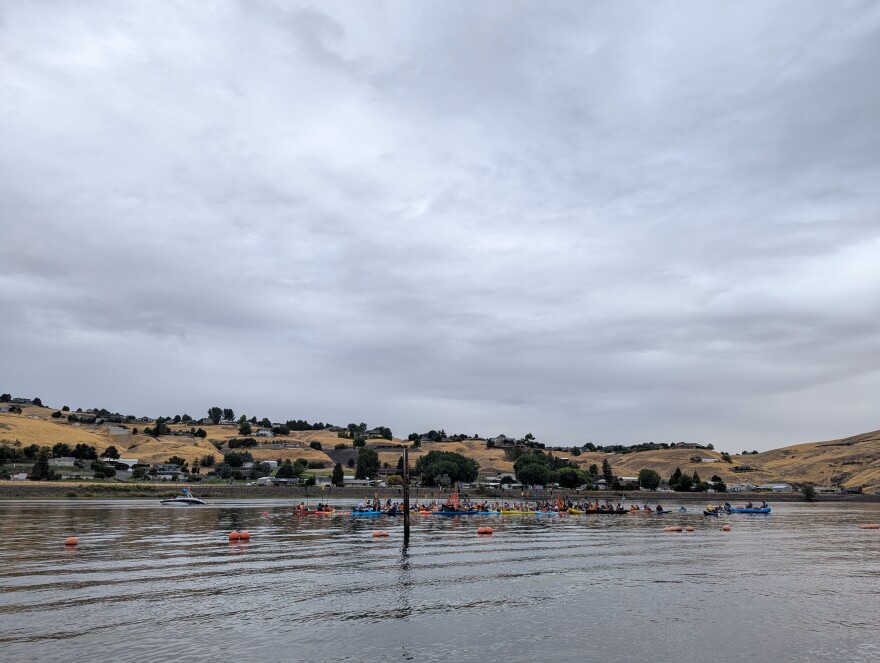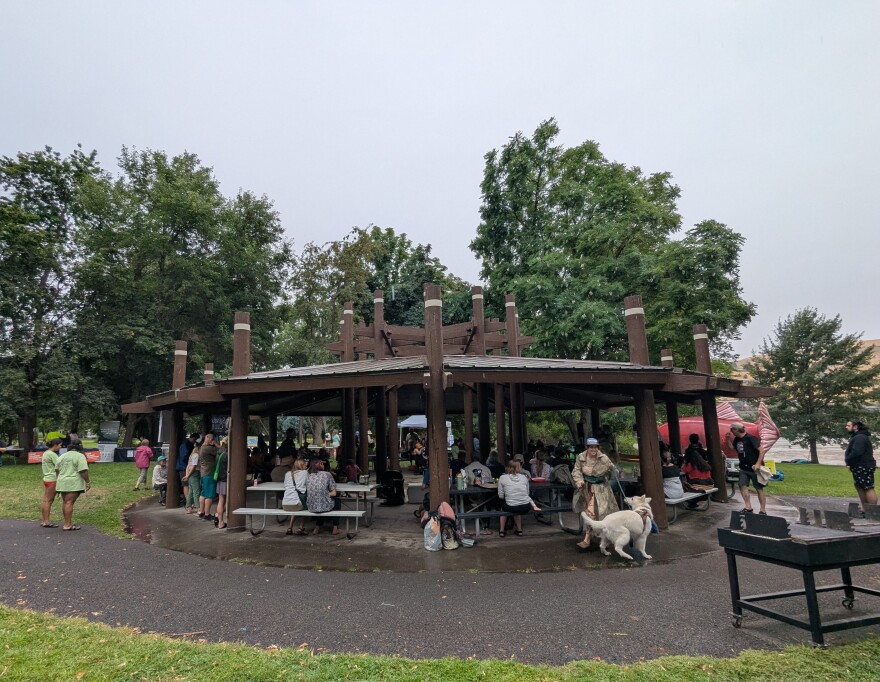A grey sky hangs over the Snake River on a dreary August Saturday. Dozens of people in kayaks, canoes and on paddle boards have been paddling for an hour from Asotin, Washington, to Hells Gate State Park in Lewiston, Idaho.
They started circling, and chanted, “Free the snake!”
Nez Perce tribal members, in traditional hand carved canoes, lead the flotilla.
“We’re asking for permission to come ashore,” Gary Dorr called out to Ione Jones, who stood on the rocky shoreline.
“ I'm opening up. Myself, this water, this land with the song,” said Jones, before belting out a traditional song on the river shoreline.
Jones is a member of the Palouse Tribe. She said she feels her ancestors’ presence when she sings.
“I feel my ancestors with us strongly, guiding us down the river,” she said. “I can feel them hugging me, kissing me. I can feel them telling me, keep going.”
The flotilla is about celebrating the connection of people to the water and to nature, said Jones.
“Get out and get your hands dirty. Understand what it means to see, what the water temperature feels like. It's not supposed to be this warm,” Jones said as she moved her hand through the river.
After the canoes were loaded onto the shore, everyone made their way to the park.
Julian Matthews is the coordinator for Nimiipuu Protecting the Environment, a native-led nonprofit. He took a seat under a gazebo at the park as people lined up for salmon and fry bread.
“This is the most watercraft I've seen for one of these events, so it's turned out really good, and I'm really glad that we have such support for pushing the issue of dam breaching on the Snake River dams,” Matthews said.
U.S. Secretary of Health and Human Services Robert F. Kennedy Jr. recently visited the Nez Perce Tribal Hatchery in Idaho to meet with tribal leaders and discuss their work in preserving traditional foods.
“It is a health issue, a lot of the foods that we ate before the migration, buffalo, deer, elk and moose, are really dwindling also, besides the salmon,” Matthews said.
Matthews recently visited Klamath Falls, where four dams were taken down.
“It was really inspirational to see how that water flows freely now, and the fish are already starting to come back where the dams were removed,” he said.
Before joining the Trump administration, Kennedy did work as an environmental lawyer. During his visit to Idaho, he mentioned his past work trying to get the lower Snake River dams removed.
Senate Republican leaders issued a statement making it clear that they disagree with Kennedy about removing the dams.
In June, the Trump administration cancelled an agreement with tribes in the Columbia River Basin. The agreement paused salmon lawsuits in exchange for water restoration and clean energy projects.
“ That was bad news for the tribe,” Matthews said. “But you know, to me, realistically, and a lot of times, this is my personal thing, they try to throw money at stuff. Give 'em money. A lot of 'em are just stopgap measures that aren't really gonna help in the long run.”
The Tribe has long argued that by putting in the dams and causing the salmon population to fall, the federal government is violating the Nez Perce Treaty of 1855, which is supposed to guarantee fishing rights to tribal members.
“That's why we pushed this issue because it's a big issue,” Mathews said. “It’s a legal issue.”
But he doesn’t think the government is going to solve it.
“ We need to get all the people that are involved, the stakeholders, the irrigators, you know, the bargers, and get them together and work out these issues,” he said. “Because right now, it's not working.”
While standing on the shore of the Snake River next to his wooden canoe, Nez Perce Tribal member Gary Dorr said the political atmosphere is a lot different these days.
“ People can get scared, but we just have to have faith in our prayers,” he said. “When we make these prayers with one heart, one mind, then stuff's gonna happen. And so it may not be today or tomorrow or next week, but we have faith in our prayers.”





